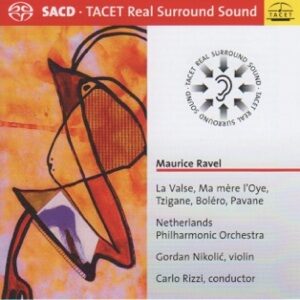Can a recording be too lifelike? Here’s a puzzle for you. This Ravel recital is very well played and amazingly well recorded, and yet the total impression it leaves is somewhat disappointing. It’s sort of like expecting to see a sexy nude photo and instead getting a series of x-rays. This isn’t to say that the engineering diminishes the performances, but it does highlight their faults. In La Valse, despite a basically swift tempo, there’s a definite lack of power, of dynamic range—not in the recording, but in the playing. The same is true of Boléro, a very deliberate interpretation close in tempo (at 16 1/2 minutes) to Ravel’s own. Conductor Carlo Rizzi doesn’t let the music build to the most explosive possible climax: it’s too comfortable. It has no edge. Where is that piccolo trumpet, for example, at the final repetition of the theme?
Of course, much of this music really is comfortable, or at least very, very pretty. The Mother Goose Suite truly is gorgeous, and the timbres glow (in SACD stereo, as I listened to them). The Pavane is also lovely, but then, it always is. Tzigane, probably Ravel’s most irritating piece of music, is very well played by Gordan Nikolic, who delivers plenty of passion and improvisatory freedom at the start without ever becoming off-putting. So the problem is this: Tacet provides state-of-the-art engineering, but anyone buying this audiophile product will want to be blown away by the big moments, and with the best will in the world, we just aren’t. The fault, ultimately, is Rizzi’s, who like so many conductors today needs to learn how to stop fussing, let go, and “play loud”.
































